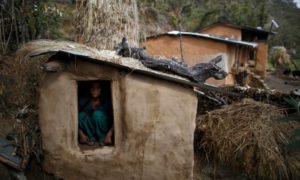
Nepali Women Suffocates In Outlawed Menstruation Hut
Police say that a woman has passed away in Nepal as she suffocated in a hut during her period. This incident happened after a couple of weeks after a mother and two of her children died in a similar scenario.
A tradition in Nepal that is called “Chhaupadi” believes that menstruating women are impure and are forced to stay and sleep in a hut that is far away from their homes, this tradition is quite old and is actually centuries old.
21-year-old Parbati Bogat was found dead in a hut that was filled with smoke on Thursday morning in the Doti district, she was found dead by her mother-in-law.
Lal Bahadur Dhami the Local Police Officer said: “We suspect she died due to smoke inhalation and suffocation because she closed the door of the windowless hut and lit a fire on the floor for warmth during the night.”
Inspector Dhami said that the body has been sent for an autopsy.
The tradition was banned in 2005, but locals are still forcing the tradition in the western regions of Nepal, especially the remote regions.
The tradition is somehow associated with Hinduism, as they consider women untouchable after the give birth or are having their period. Women are not allowed to touch food, men, religious icons, and cattle.
3 weeks ago, a mother and her 2 sons were found dead in Bajura District, they died from the same reason, police say that the mother was following the tradition and passed away because of the smoke.
Locals are now demolishing the Chhaupadi sheds, the police have also warned the locals to stop the tradition or else they could face charges.
In 2018, Kathmandu introduced a law that will sentence anyone who gets caught in Chaaupadi, the law will let the person serve 3 months in jail a fine of Rs. 3000 will be charged.
Ganga Chaudhary drafted the law, he says that there a lot more things to be done in order to strengthen the legislation.
Ganga Chaudy said that: “We have realized that only legal provisions are not enough to end such practices. We need to focus on awareness and educating women.”